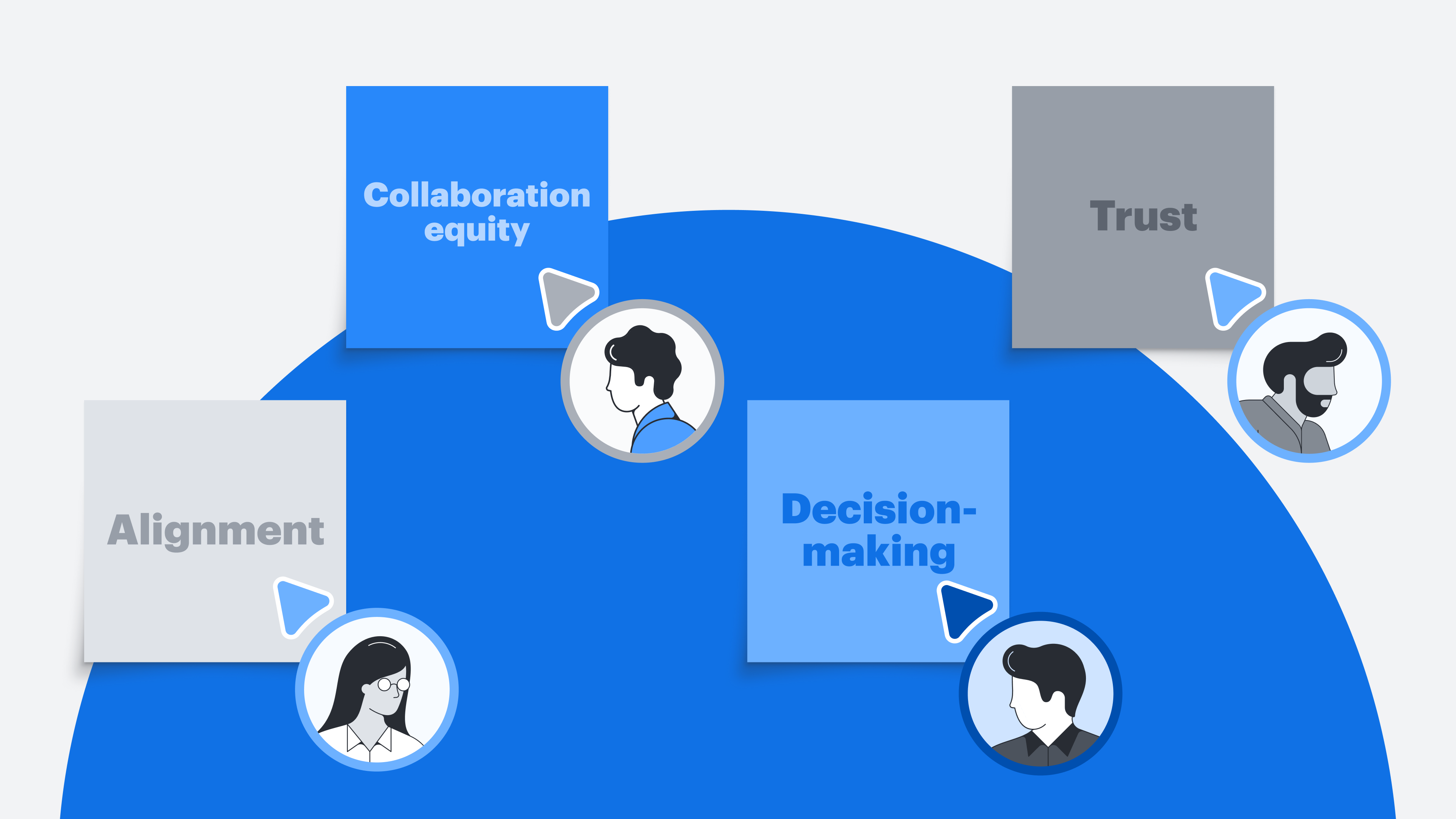
How visual collaboration supports all communication styles
Reading time: about 7 min
Topics:
Teams come in all shapes, sizes, and structures, and with diverse teams come diverse communication styles. As we outlined previously, there are four main types of communicators: analytical, intuitive, functional, and personal.
The digital age we work in today also significantly impacts how we collaborate. The workplace is a melting pot of preferences, personalities, and backgrounds. Some may prefer to collaborate asynchronously, while others thrive on seeing their coworkers face to face, whether in the office or over video conferencing.
The bottom line? Everyone collaborates and communicates differently. We build stronger, more effective teams when we implement effective, realistic ways to support this diversity.
In this article, we will explain why visual collaboration is vital in the workplace and share some actionable tips on how Lucid can help unify all teams.
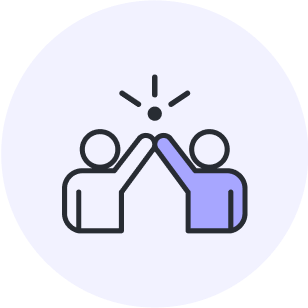
Why teams need visual collaboration
Visual collaboration is a relatively new concept. In the past, we’ve relied on written and verbal communication to work on projects, share messages, and communicate with coworkers. As the workplace has evolved over the years, visual collaboration has become the most powerful way to create a shared language no matter what team or organization you belong to.
Using visuals to communicate is proven to increase a team’s ability to understand and retain information. Visual collaboration is an easier and more natural way to clarify complex data, processes, and ideas, as opposed to relying solely on a text document. It unifies teams and stakeholders, creating a shared language and leaving little room for miscommunication.
Additionally, using visuals to communicate allows us to more easily identify gaps or areas of opportunity for improvement. Visuals enable us to drive more effective conversations that move the needle toward innovation and prioritize the most impactful work.
How visual collaboration supports all teams
Visual collaboration supports teams of all types of people, helping to unify team members, make decisions faster, and streamline workflows. No matter how you prefer to communicate and collaborate, visual collaboration can accommodate the entire group. Here’s how:
It facilitates collaboration equity
Visual collaboration solutions support teams by giving all members equal opportunity to share and contribute ideas. Through collaboration equity, employees are given a voice and a space to participate, regardless of their working location, communication style, role, or level. Collaboration equity gives everyone the context they need to participate in a way that works for them.
For example, visual collaboration helps expressive collaborators unlock creativity and think clearly. Solutions for visual collaboration like Lucid equip them with sticky notes, emoji reactions, and freehand drawings to explore their ideas and share them with the team.
Visual collaboration also accommodates more introspective collaborators, who would prefer to work asynchronously before coming together as a group. They still get the context they need while also having more time to work through their thoughts by themselves.
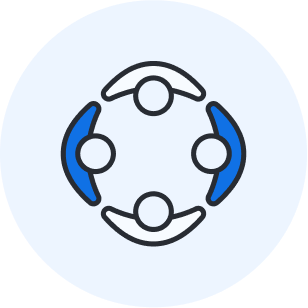
Create more collaboration equity in your next meeting.
Find out howIt enables better decision-making
Using a modern visual collaboration solution like Lucid helps organizations make better, more inclusive decisions. By centralizing information and making it easily accessible, teams can quickly synthesize information. Visualizing how decisions impact systems, processes, and milestones helps teams understand the broader effects of their choices.
Visual Activities are a great way to capture everyone’s vice equally. They allow you to share short, interactive surveys with teammates to complete individually. After everyone has completed the survey, view the results together to identify gaps and areas of alignment and decide how to best move forward as a team. Whether you want to vote on your favorite ideas, gather feedback, or prioritize tasks, this method of decision-making eliminates groupthink and gives you an accurate picture of how your team really feels.
Analytical communicators will appreciate using data to drive conversations and decisions. They can gauge how the group feels, quickly access information, and have essential conversations as needed, all within the same canvas. When we can put our ideas down visually, it helps to align everyone, regardless of their preferred method of collaborating.
It boosts alignment
Visual collaboration fosters team alignment by keeping essential information accessible, eliminating confusion, and reducing the time spent searching for context. When everyone is on the same page, teams can focus on doing their best work efficiently and effectively.
One way that teams can achieve alignment and stay organized is with team hubs in Lucid. In team hubs, leaders can create valuable documentation that helps achieve ongoing alignment. It’s a shared space for all members to house resources, coordinate work, and track progress. That way, if a team member is out or if a new team member joins, they can reference this visual documentation and easily be brought up to speed. Within team hubs, teams can also brainstorm, create timelines, participate in icebreakers, and much more.
Achieving alignment through visual collaboration is a functional communicator’s dream. Allowing them to visually map out projects, document processes, and share real-time feedback enhances both clarity and understanding. These visuals promote streamlined collaboration where ideas can be easily shared and refined.

It builds trust
The foundation of any great team is trust. Without it, collaboration, engagement, and morale can fall by the wayside, slowing productivity and progress. Setting aside time for intentional moments to connect builds trust. Learning your team’s collaboration and communication preferences is a great start. To take that further, consider sharing photos, personal updates, wins, and more in a shared space, like a team space.
In team spaces, you can have an intentional place to coordinate and connect with your team. Think of team spaces like home base. Give project updates, review timelines, and host icebreakers.
Icebreakers are a fun and easy way to build trust and strengthen camaraderie. They are designed to facilitate connection and warm up the group before a meeting, event, or project kickoff. There are many proven benefits of icebreakers, including:
- Building trust.
- Starting meetings off right.
- Taking a small "brain break" during the day.
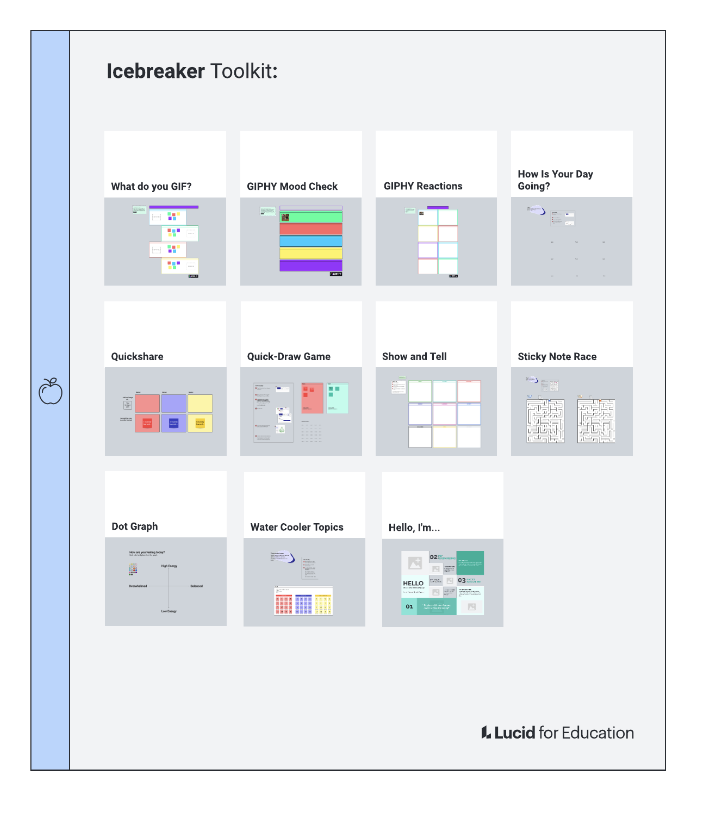
Visual activities in Lucid can also be used as icebreakers. As mentioned above, Visual Activities are great for gathering feedback and deciding on next steps but are also used for jumpstarting engagement and connecting with your team. There are a wide range of Visual Activities, from french fry ranking to how your team is doing, and other fun activities.
Hosting a simple icebreaker before your next meeting will especially help the personal communicators on your team who value teamwork and collaboration. You’ll also be playing to their strength of boosting team morale. Consider giving the personal communicators ownership over leading an icebreaker to engage the group.
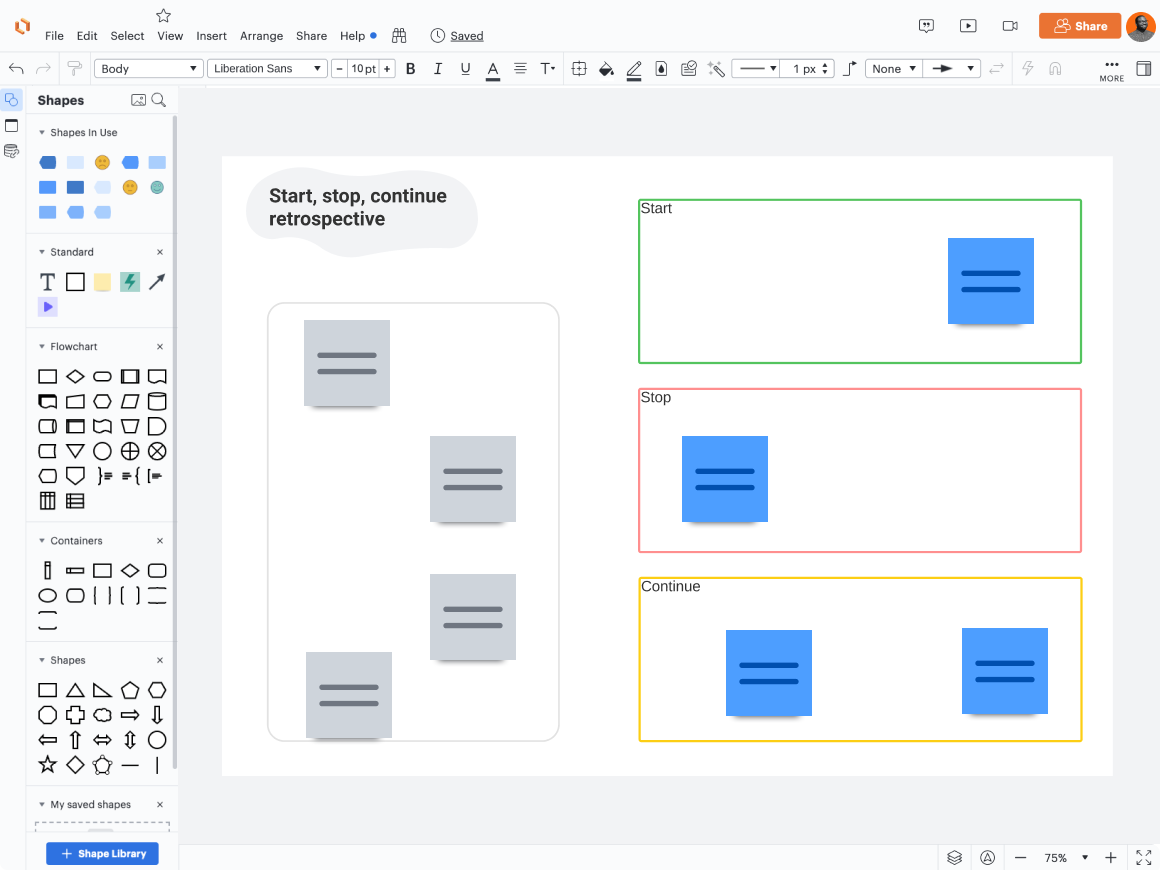
It accommodates different working styles
Visual collaboration provides both structure and flexibility to accommodate a variety of working preferences.
For example, by using Lucid during meetings, collaborators have access to features like:
- Facilitator Tools to help keep everyone focused on particular content within the document.
- Voting to synthesize the group's ideas in real time and develop an action plan moving forward.
- Breakout boards for dividing up a large group into smaller groups for more collaborative brainstorming.
Even when teams collaborate asynchronously, they can still access the most recent project updates and information. With the comment, @mention, and chat functionality, people can have conversations right on their board, so context isn’t lost.
Having a solution that caters to all working styles is crucial for giving team members a voice and a space to connect, no matter where or how they work.
It streamlines work
When companies, organizations, and teams are able to streamline systems and processes, they increase efficiency, improve consistency, and boost productivity.
One way Lucid helps teams streamline their workflow is through templates. Rather than starting from scratch, templates help create uniformity and a shared visual language for all collaboration styles.
Additionally, Lucid’s integrations marketplace connects you to all of your team’s favorite apps, helping to unify team members who are active in other tools, like Slack, Asana, or Microsoft Teams.
No matter what types of collaborators and communicators you have on your team, visual collaboration can accommodate them all by promoting clarity, engagement, and innovation.
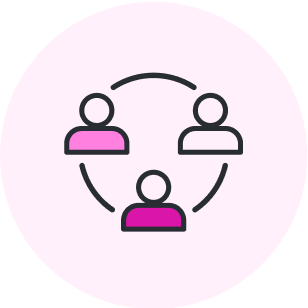
Explore more ways to fully harness the power of visual collaboration on your team.
Go nowAbout Lucid
Lucid Software is the leader in visual collaboration and work acceleration, helping teams see and build the future by turning ideas into reality. Its products include the Lucid Visual Collaboration Suite (Lucidchart and Lucidspark) and airfocus. The Lucid Visual Collaboration Suite, combined with powerful accelerators for business agility, cloud, and process transformation, empowers organizations to streamline work, foster alignment, and drive business transformation at scale. airfocus, an AI-powered product management and roadmapping platform, extends these capabilities by helping teams prioritize work, define product strategy, and align execution with business goals. The most used work acceleration platform by the Fortune 500, Lucid's solutions are trusted by more than 100 million users across enterprises worldwide, including Google, GE, and NBC Universal. Lucid partners with leaders such as Google, Atlassian, and Microsoft, and has received numerous awards for its products, growth, and workplace culture.
Related articles
15 hacks for making your meetings more productive with Lucid
Here are some simple hacks you can do in Lucid to save time so you can collaborate more efficiently with your team during meetings.
How to strengthen team morale and engagement with better collaboration
Here’s how a few leaders and builders in the collaboration space are building stronger team cohesion and morale.
4 visual collaboration tips to boost team engagement and productivity
In this blog post, we’ll uncover the benefits of visual collaboration and provide tips for collaborating visually with your team.
Why visual collaboration is essential to the digital workplace framework
Discover how visual collaboration, a key part of the Gartner® Digital Workplace Framework, helps teams work more efficiently.
Bring your bright ideas to life.
By registering, you agree to our Terms of Service and you acknowledge that you have read and understand our Privacy Policy.